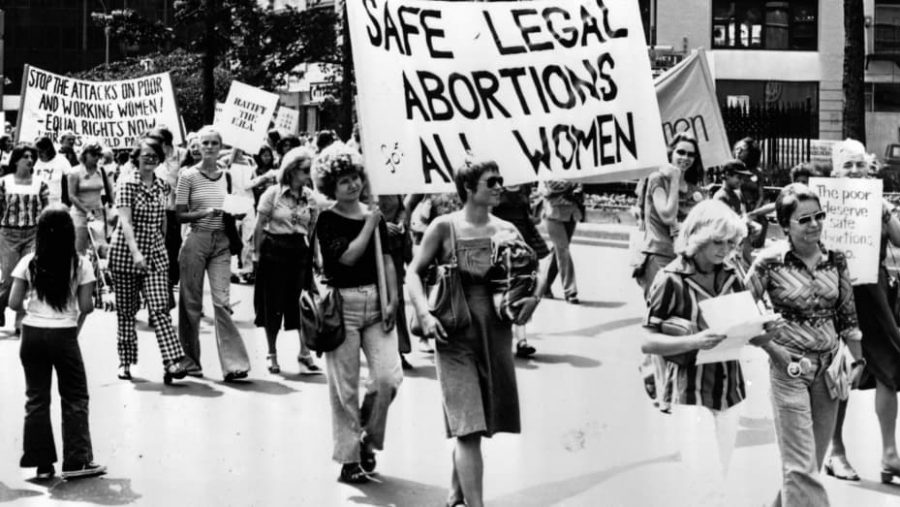What’s happening with Roe v. Wade?
January 6, 2022
Now more than ever, cases with decades of precedent are again being brought before the Supreme Court. Currently, the court is hearing Dobbs v. Jackson Women’s Health Organization, as it’s serving as a sidebar for Roe v. Wade. Roe v. Wade was a historic court case passed in 1973, and essentially allowed women to recieve abortions legally without government restriction. Jane Roe was the plaintiff who sued the district attorney of Dallas County over a Texas statute that criminalized abortion in cases not related to health emergencies. Roe won on the grounds of the Texas state laws being vague and restricting her right to privacy, and it has been upheld by the First, Fourth, Fifth, Ninth, and Fourteenth Amendments.
Background
Dobbs v. Jackson Women’s Health Organization, the only open state abortion clinic, challenged “a regime of Mississippi laws and regulations that have created unconstitutional barriers to the right to safe, legal abortion and that violates the Supreme Court’s standard in Whole Woman’s Health v. Hellerstedt.” The excessive restrictions attached to Mississippi’s ban include: a TRAP (targeted restrictions on abortion providers) licensing scheme, 24 hour mandatory delay (large waiting period), a two trip requirement (multiple visits before abortion), a physician only law (restricting what medical professionals can preform the procedure), a telemedicine ban (no online consultations or prescriptions), and both a 15 week and a six week ban (crime to peform abortions after this time).
On every circuit this hearing was taken to, each separate court affirmed Roe v. Wade (additionally Whole Woman’s Health v Hellerstedt) and kept to precedent, overturning this unconstitutional ban. About five months after yet another appeals court struck this down, the Supreme Court agreed to hear arguments.
Many of the current justices, most notably the recently appointed Amy Coney Barrett, are outspoken about being pro-life. Though history shows that judges appointed by conservative presidents also rule conservatively— sticking with the most literal translations of the constitution and precedent rather than adapting laws with time and circumstance—this seems likely to be an exception. People fear that the partisan nature of the current Supreme Court Justices will cause them to rule through a political lens rather than as impartial extensions of the law, overturning abortion because they’re personally pro life, rather than following the precedent they set fifty years ago.
Potential Outcomes
If Roe v. Wade gets overturned, power of decision would likely return to states. The Guttmacher Institute has analyzed that 21 states are certain to put bans on abortions, and another five are likely to follow. Much of the East and West coasts will keep providing access to safe abortions and health centers, while the states of Arkansas, Idaho, Kentucky, Louisiana, Mississippi, Missouri, North Dakota, have laws that would ban or restrict abortion immediately if Roe v. Wade is overturned.
Within these states, there are a few different practices they could enact to restrict abortion. The first is a complete halt: something that Alabama, Louisiana, Tennessee and West Virginia explicitly state in their constitution. The second is regulation of abortion time, like how Texas banned abortion after six weeks, and the third is trigger laws: where “as long as Roe v. Wade remains the law of the land, trigger bans can’t actually go into effect. If they do take effect, no one is certain what implementation will look like.”
Looking beyond the political ramifications, if Roe v. Wade gets overturned, the rate of abortion isn’t likely to drastically decrease. For example, during a four year period from 2010-2014, abortions happened just as frequently in the most restrictive places as it did where access to care was plentiful. The only large differences between these countries was that a lot more women died where abortion was banned, because the only places and people that supplied it had poor sterilization, little to no training, or were actively acting against the law. Dr. Jody Steinauer, director of the Bixby Center for Global Reproductive Health, says, “The bottom line is that these restrictions … cause unnecessary harm and delay women in accessing the care they need.”
The first arguments for Dobbs v. Jackson’s Women’s Health Organization were heard on December 1st, 2021, and we should expect a ruling around spring 2022. Pro-choice or pro-life, the Supreme Court ruling will mark a turning point for at least the next fifty years in our country.
While some people aren’t that worried either way, knowing that day to day life and healthcare in New York won’t drastically change, many more are nervous, like Juliette Zakrzewska, an iSchool junior. “Six out of nine Justices are male,” she explains. “Men are still deciding on what women can and can’t do with our bodies, even though they’ll never experience pregnancy or motherhood themselves. It feels like my identity is a political bargaining chip.”



